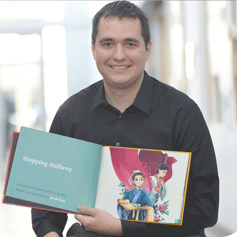
Student Venture Tests New Social Business Model
Tuesday, April 1, 2014
BY BRIDGET AYMAR
Full-Time MBA student Jeff Ochs is helping build a new sector of business that combines the public good mission of a non-profit organization with the profitability and private ownership structure of a for-profit company. In addition to supporting a variety of initiatives to fuel statewide growth of “social business,” he recently launched Cornerstone Stories to examine the model in action.
Storybooks promote understanding and learning
Cornerstone Stories offers custom children’s storybooks that reflect a family’s unique blend of values and culture. To create a book, customers choose four stories from a sizable catalog of illustrated fables and parables from around the world. They can also select the language for each story and add personalized dedications. Cornerstone Stories then prints, binds, and ships the customer a special book.
The company’s social goal is to preserve and pass on the world’s fables and parables, many of which are currently missing from the marketplace, and to do so in a way that increases cross-cultural awareness.
“These publicly owned stories are valuable, meaningful, culturally relevant, and historic, but they aren’t being reproduced or sold elsewhere,” says Ochs. “Ironically because anyone can sell them, no one currently does. That’s a tragedy, but it’s one that our social business model can address. We also believe that sharing these stories will help break down cultural barriers.”
Social business model combines public good and profit
Cornerstone Stories is a social business: it follows a public good mission while building financial value for investors. Ochs designed the venture as a testing ground for the new business model.
“Social Business is about pursuing a double bottom line. Within the same business, we’re trying to make a concrete social impact as well as make a profit,” he says. “Cornerstone Stories is a way for me to push the envelope as a practitioner while I help develop the sector as a whole.”
Ochs believes the social business model could put the power of capitalism to work on important issues. As government funds to support social innovation diminish and the pressures of creating shareholder value outweigh corporate responsibility, the model could be a sustainable solution for responsible business.
Supporting a fourth sector of business
Through his involvement with a special committee of the Minnesota State Bar Association, Ochs has contributed to a state statute that would create a new corporate form specifically suited to social businesses, the “Public Benefit Corporation.” Enacting the new form will be a major first step toward carving out a new sector of the economy in which social businesses can thrive. But other barriers remain.
“Even with the creation of a special corporate form, social businesses will still face a lot of initial skepticism,” says Ochs.
To raise awareness and support for the model, Ochs co-wrote a provocative white paper discussing the emergence of social business in Minnesota. In his role as board member of the Social Enterprise Alliance—Twin Cities, he routinely takes the social business message out to the community.
In cultivating a supportive environment for social business, access to capital is critical. In addition to helping envision and pilot a new development pipeline that can involve philanthropic, impact, and for-profit investors strategically at different stages, Ochs has been an active supporter of the new IMNPACT Angels investment network.
Carlson School Supports Entrepreneurs
Jeff Ochs has led a non-profit, launched an award-winning party game called Snake Oil, and conceived a social business. Along the way, he’s utilized an array of Carlson School resources.
Purpose and Profit grant: In partnership with Quality Bicycle Parts, this program provides seed funding to student-run ventures that demonstrate sustainable business practices and environmental stewardship, community service, or biking advocacy.
Sands Fellowship: Offered through the Graduate Business Career Center, this new resource provides support for social ventures.
STARTUP: This course, offered at the undergraduate and graduate level, guides students on the development and implementation of a business plan.
Dual Degree program: This academic degree option enables students to obtain an MBA alongside a complementary graduate degree in an accelerated timeline.
